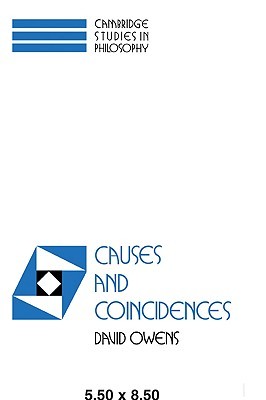
- We will send in 10–14 business days.
- Author: David Owens
- Publisher: Cambridge University Press
- ISBN-10: 0521044480
- ISBN-13: 9780521044486
- Format: 14 x 21.6 x 1.2 cm, minkšti viršeliai
- Language: English
- SAVE -10% with code: EXTRA
Reviews
Description
In an important departure from current theories of causation, David Owens proposes that coincidences have no causes, and that a cause is something that ensures that its effects are no coincidence. He elucidates the idea of a coincidence as an event that can be divided into constituent events, the nomological antecedents of which are independent of each other. He also suggests that causal facts can be analyzed in terms of non-causal facts, including relations of necessity. Thus, causation is defined in terms of coincidence, and coincidence without reference to causation. In a book that will be of particular interest to those concerned with the role of causation in the philosophy of mind, David Owens challenges ideas of Hume, Davidson and Lewis, and offers novel solutions to the problems still confronting theorists of causation.
EXTRA 10 % discount with code: EXTRA
The promotion ends in 22d.21:33:00
The discount code is valid when purchasing from 10 €. Discounts do not stack.
- Author: David Owens
- Publisher: Cambridge University Press
- ISBN-10: 0521044480
- ISBN-13: 9780521044486
- Format: 14 x 21.6 x 1.2 cm, minkšti viršeliai
- Language: English English
In an important departure from current theories of causation, David Owens proposes that coincidences have no causes, and that a cause is something that ensures that its effects are no coincidence. He elucidates the idea of a coincidence as an event that can be divided into constituent events, the nomological antecedents of which are independent of each other. He also suggests that causal facts can be analyzed in terms of non-causal facts, including relations of necessity. Thus, causation is defined in terms of coincidence, and coincidence without reference to causation. In a book that will be of particular interest to those concerned with the role of causation in the philosophy of mind, David Owens challenges ideas of Hume, Davidson and Lewis, and offers novel solutions to the problems still confronting theorists of causation.


Reviews